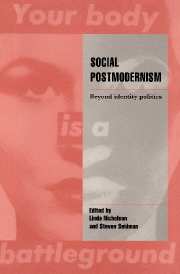Book contents
- Frontmatter
- Contents
- Notes on contributors
- Acknowledgements
- Introduction
- Part I Critiques of identity
- Part II Critiques of the deconstruction of identity
- Part III Postmodern approaches to the social
- 7 Gender as seriality: thinking about women as a social collective
- 8 Refiguring social space
- 9 Just framing: ethnicities and racisms in a “postmodern” framework
- 10 Politics, culture, and the public sphere: toward a postmodern conception
- Part IV Postmodern approaches to the political
8 - Refiguring social space
Published online by Cambridge University Press: 29 October 2009
- Frontmatter
- Contents
- Notes on contributors
- Acknowledgements
- Introduction
- Part I Critiques of identity
- Part II Critiques of the deconstruction of identity
- Part III Postmodern approaches to the social
- 7 Gender as seriality: thinking about women as a social collective
- 8 Refiguring social space
- 9 Just framing: ethnicities and racisms in a “postmodern” framework
- 10 Politics, culture, and the public sphere: toward a postmodern conception
- Part IV Postmodern approaches to the political
Summary
… the principles consistently advocated by the civil rights movement for two centuries following the American Revolution – individual rights and equality under law – … which were abandoned in the mid-1960s by the modern civil rights establishment, translate neatly into a viable, forward-looking civil rights program that can at once counter the left's agenda while it confronts the civil rights issues that exist today.
Clint Bolick, “A Conservative Civil Rights Agenda,” Human Events, February 20, 1988It may seem farfetched to imagine the American new right as the appropriate inheritors of the civil rights tradition. But from their rise as a far-right fringe in the late 1970s to the diffusion of their politics in the PC debates beginning in the late 1980s, the new right systematically poached progressive political discourse. By the end of the 1980s, the relationships among a cluster of concepts and their easy association with political positions (for example, family=right; culture or identity=left) had broken down. This labor on discursive terrain was not simply a series of rhetorical appropriations between two easily defined sides but marked a careful gambit in which the new right challenged the meaning and practical effects of civil rights by refiguring the idea which had once secured them.
The partially secularized new right of the 1980s entered politics through adoption of an identity, modeled, ironically enough, on the last entrant into civil rights claims: the most articulately voiced identity of the 1980s – “gay” identity. But combating the proliferating ethnic, sexual, and other identities required more from these rightists than simply adopting their own name.
- Type
- Chapter
- Information
- Social PostmodernismBeyond Identity Politics, pp. 216 - 249Publisher: Cambridge University PressPrint publication year: 1995
- 72
- Cited by

